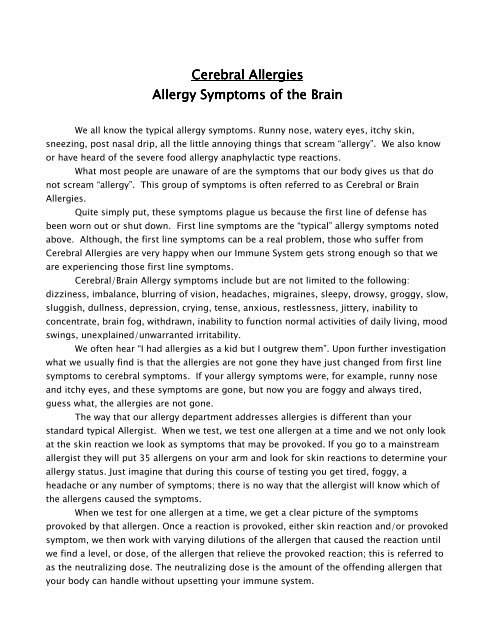Cerebral Allergies Cerebral Allergies Allergy Symptoms of the Brain ...
Cerebral Allergies Cerebral Allergies Allergy Symptoms of the Brain ...
Cerebral Allergies Cerebral Allergies Allergy Symptoms of the Brain ...
You also want an ePaper? Increase the reach of your titles
YUMPU automatically turns print PDFs into web optimized ePapers that Google loves.
<strong>Cerebral</strong> <strong>Allergies</strong><br />
<strong>Allergy</strong> <strong>Symptoms</strong> <strong>of</strong> <strong>the</strong> <strong>Brain</strong><br />
We all know <strong>the</strong> typical allergy symptoms. Runny nose, watery eyes, itchy skin,<br />
sneezing, post nasal drip, all <strong>the</strong> little annoying things that scream “allergy”. We also know<br />
or have heard <strong>of</strong> <strong>the</strong> severe food allergy anaphylactic type reactions.<br />
What most people are unaware <strong>of</strong> are <strong>the</strong> symptoms that our body gives us that do<br />
not scream “allergy”. This group <strong>of</strong> symptoms is <strong>of</strong>ten referred to as <strong>Cerebral</strong> or <strong>Brain</strong><br />
<strong>Allergies</strong>.<br />
Quite simply put, <strong>the</strong>se symptoms plague us because <strong>the</strong> first line <strong>of</strong> defense has<br />
been worn out or shut down. First line symptoms are <strong>the</strong> “typical” allergy symptoms noted<br />
above. Although, <strong>the</strong> first line symptoms can be a real problem, those who suffer from<br />
<strong>Cerebral</strong> <strong>Allergies</strong> are very happy when our Immune System gets strong enough so that we<br />
are experiencing those first line symptoms.<br />
<strong>Cerebral</strong>/<strong>Brain</strong> <strong>Allergy</strong> symptoms include but are not limited to <strong>the</strong> following:<br />
dizziness, imbalance, blurring <strong>of</strong> vision, headaches, migraines, sleepy, drowsy, groggy, slow,<br />
sluggish, dullness, depression, crying, tense, anxious, restlessness, jittery, inability to<br />
concentrate, brain fog, withdrawn, inability to function normal activities <strong>of</strong> daily living, mood<br />
swings, unexplained/unwarranted irritability.<br />
We <strong>of</strong>ten hear “I had allergies as a kid but I outgrew <strong>the</strong>m”. Upon fur<strong>the</strong>r investigation<br />
what we usually find is that <strong>the</strong> allergies are not gone <strong>the</strong>y have just changed from first line<br />
symptoms to cerebral symptoms. If your allergy symptoms were, for example, runny nose<br />
and itchy eyes, and <strong>the</strong>se symptoms are gone, but now you are foggy and always tired,<br />
guess what, <strong>the</strong> allergies are not gone.<br />
The way that our allergy department addresses allergies is different than your<br />
standard typical Allergist. When we test, we test one allergen at a time and we not only look<br />
at <strong>the</strong> skin reaction we look as symptoms that may be provoked. If you go to a mainstream<br />
allergist <strong>the</strong>y will put 35 allergens on your arm and look for skin reactions to determine your<br />
allergy status. Just imagine that during this course <strong>of</strong> testing you get tired, foggy, a<br />
headache or any number <strong>of</strong> symptoms; <strong>the</strong>re is no way that <strong>the</strong> allergist will know which <strong>of</strong><br />
<strong>the</strong> allergens caused <strong>the</strong> symptoms.<br />
When we test for one allergen at a time, we get a clear picture <strong>of</strong> <strong>the</strong> symptoms<br />
provoked by that allergen. Once a reaction is provoked, ei<strong>the</strong>r skin reaction and/or provoked<br />
symptom, we <strong>the</strong>n work with varying dilutions <strong>of</strong> <strong>the</strong> allergen that caused <strong>the</strong> reaction until<br />
we find a level, or dose, <strong>of</strong> <strong>the</strong> allergen that relieve <strong>the</strong> provoked reaction; this is referred to<br />
as <strong>the</strong> neutralizing dose. The neutralizing dose is <strong>the</strong> amount <strong>of</strong> <strong>the</strong> <strong>of</strong>fending allergen that<br />
your body can handle without upsetting your immune system.
We treat with <strong>the</strong> neutralizing doses by using allergy drops twice weekly, given orally.<br />
This will allow you to come into contact with <strong>the</strong> <strong>of</strong>fending allergens, decrease your reaction<br />
to <strong>the</strong> allergen and help protect <strong>the</strong> immune system from over reacting. Doing this gives <strong>the</strong><br />
immune system a “break,” helps you to get <strong>the</strong> most from all <strong>the</strong> good things that you are<br />
doing to build up <strong>the</strong> immune system up; to improve you recovery.<br />
It is important to remember that allergens are not limited to thing in your<br />
environment. Many foods that are part <strong>of</strong> your everyday diet can be contributing to<br />
<strong>the</strong> symptoms many experience. Frequently, <strong>of</strong>fending allergens are in <strong>the</strong> most<br />
unlikely <strong>of</strong> places. This information touches on <strong>the</strong> most basic aspects <strong>of</strong> a complex<br />
problem. We welcome any and all questions.<br />
Please do not hesitate to contact our <strong>of</strong>fice with any questions or requests for<br />
additional information.<br />
Sandi Jaffe<br />
Director <strong>of</strong> <strong>Allergy</strong>


